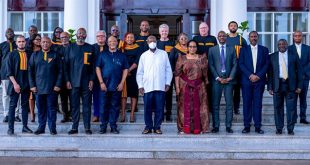
Life when you cannot use a computer, smart phone, ATM
Kampala, Uganda | RONALD MUSOKE | Beatrice Guzu, the executive secretary of the National Council for Disability has been visually impaired (blind) all her life.
She says throughout her student life, she experienced hardships that only blind students face. Her books were bulkier. Then she had to get other students read back documents; especially lesson notes for her. When she eventually got introduced to information communication technologies (ICTs), she says, she felt relieved.
“I became independent,” Guzu says, “ICTs are not a matter of luxury anymore for people with disability.”
When she spoke at a forum organized by the Collaboration on International ICT Policy for East and Southern Africa (CIPESA) last December in Kampala, Guzu gave moving testimony of the challenges that PWDs face when it comes to ICTs.
The United Nations Educational, Scientific and Cultural Organisation (UNESCO) says the internet and related technologies have the potential to improve the lives of People with Disabilities (PWDs), through empowerment, access to information, and enhancing their social and economic integration in communities.
But in order for this potential to be realized, UNESCO says, the rights of persons with disabilities must be provided for in laws and policies, and countries must take deliberate steps to ensure that persons with disabilities enjoy these rights, have access to quality information and ICT, and are protected from all forms of discrimination.
Unfortunately, Guzu says, access to ICTs remains out of reach for most disabled people in Uganda. Researchers on disability say “disability inclusion” remains a neglected and unprioritized issue.
Those with disabilities are likely to face more risks and vulnerabilities along their life cycle. Many face barriers resulting in limited participation, such as accessing public transport, getting adequate health care and employment.
Data collected by the Uganda Bureau of Statistics (UBOS) shows that persons with disabilities are often poorer than non-disabled people.
According to the 2014 national census, about 12.5% of Ugandans were estimated to have some form of disability. That figure is about 4.5 million today.
At the forum, other PWDs joined Guzu to recount the daily struggles they face to access information from government agencies and the media and many said they feel excluded.
“Most of the information is really not in accessible formats,” Guzu said, “We have the media which produces useful news but none of these print media produces their news in accessible format for persons with visual impairment.”
“I am a person who really likes reading but because it is not accessibleI have abandoned the idea,” Guzu said, “Sometimes I want to buy newspapers but I say who will read for me.”
Wrong attitude
People who can see but cannot hear,described how they struggle to figure out what the language interpreter is showing them on TV because the sign language interpreters are given a small dark space at the bottom right hand corner of their television set during prime time news – the only time an attempt is made to reach the deaf on TV.
Anne Gidudu, an official from the Uganda Parents of Persons with Intellectual Disability said although sign language interpreters are provided during prime-time news, the deaf cannot follow other basic features, such as advertisements, because they do not include sign language.
“The people with disabilities are not catered for yet they are also consumers of alcohol, beverages, and telecom products,” she said, “they cannot make out the advertisements on their own.”
Attempts by Emmanuel Mango Sanya, a station manager at Record Television, to explain why local broadcasters fail to provide sign language interpreters for many programmes; including prime time news, was challenged by the PWDs. Sanya said broadcasters understand the importance of having these but the interpreters are expensive for the media houses.
But Guzu said it is not an issue of money only. She said television station managers need to change their attitude towards PWDS.
“We need to understand this sign language interpreter is giving information to fellow Ugandans not someone who is sitting somewhere giving information to people with disability,” she said.
Guzu oversees the implementation of Uganda’s law on disability. She says the negative attitude among key government officials who are at the forefront of making decisions has not helped either.
“Sometimes these people look at disability as something which is very far away from them,” Guzu said, “If these people saw disability as something which is part of them and real in the community, we could move forward.”
Ronald Luyima who is blind described how withdrawing money from his bank account, which is a simple act for most able-bodied people, can be a nightmare for the disabled.
“At times we fear using the ATMs,” he said. He says although some banks have installed Automated Teller Machines (ATMs) with audio devices to cater for the visually impaired customers, they are not fully helpful.
“Apart from telling me to insert the ATM card and thanking me for banking with the bank, the keyboards are not helpful at all,” he said, For other PWDS who are physically challenged in height, the ATM machine is often quite high to the extent that it makes it impossible for them to operate the machine on their own.
 The Independent Uganda: You get the Truth we Pay the Price
The Independent Uganda: You get the Truth we Pay the Price



